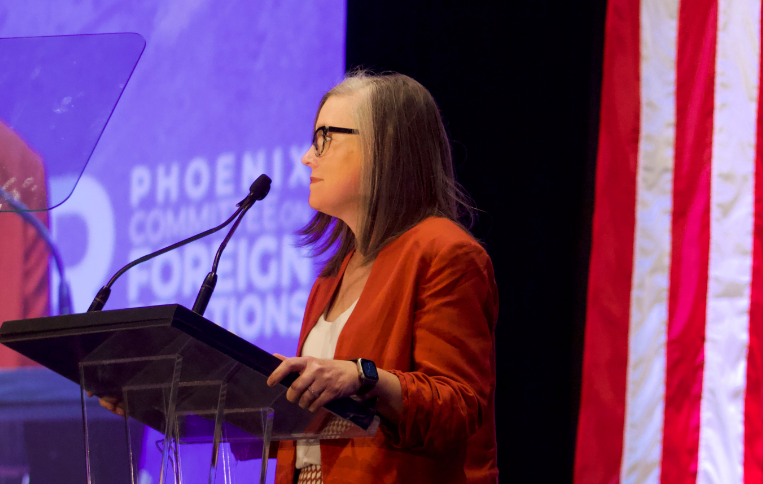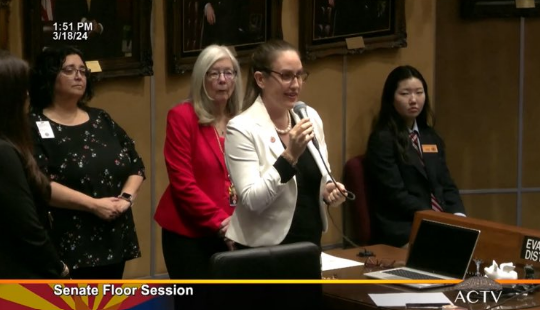
by Daniel Stefanski | Mar 23, 2024 | News
By Daniel Stefanski |
A bill to address Arizona’s homelessness crisis is advancing through the state legislature.
On Monday, the Arizona House of Representatives passed HB 2782, which would “establish a new Homeless Shelter and Services Fund, create new criminal violations involving drugs in homeless service zones, [and] transfer $5,500,000 from the FY 2024 Housing Trust Fund deposit and $50,000,000 from the Consumer Remediation Subaccount” – according to the overview provided by the chamber.
The bill, which was sponsored by State Representative Matthew Gress, was approved along party lines, with a vote of 31-28 (with one member not voting).
Gress, a Republican, wrote, “Arizona’s homelessness crisis is among the worst in the country. Between 2013-2023, total homelessness has skyrocketed nearly 300%. Our voters want us to take decisive action, and it doesn’t involve building our way out of this challenge. We must fund adequate treatment for addiction and mental health, establish greater accountability for our providers and individuals living in the streets, and allow law enforcement to do their job and arrest people who break the law. HB 2782 advances all of these priorities.”
The second-year lawmaker encouraged bipartisan cooperation on his proposal, stating, “I thank my Arizona House Republican colleagues for their support in passing this legislation and welcome House and Senate Democrats to take another look at this bill.”
The Cicero Institute responded to the positive action from the Arizona House on the bill, posting, “Thanks to the leadership of Matthew Gress, HB 2782 passed the Arizona house today. This legislation will do immense good in helping reduce homelessness and getting individuals the assistance they need for substance abuse and mental health challenges.”
The legislation received a green light from the House Committee on Appropriations last month with a 9-7 partisan vote. One member was absent.
When HB 2782 was being considered in committee, the Arizona House Democrats Caucus’ “X” account attacked the bill, writing, “Rep. Matt Gress’s NIMBY bill to make homelessness in Arizona worse in now up in Appropriations. HB 2782 criminalizes homelessness and ties the hands of cities using successful solutions like providing hotel rooms for families transitioning from the streets.”
In that committee hearing, Democrat State Representative Judy Schwiebert blasted Gress’ efforts, saying, “I’m really disappointed to see this grandstanding by the sponsor. It doesn’t provide real solutions.”
Republican State Representatives Selina Bliss, Lupe Diaz, David Livingston, and Julie Willoughby joined as co-sponsors on the bill.
On the Arizona Legislature’s Request to Speak system, representatives from QuikTrip and Cicero Action support the bill. Representatives from Living United for Change in Arizona, Native American Connections, Arizona Coalition to End Sexual and Domestic Violence, Chicanos Por La Causa Inc., American Civil Liberties Union of Arizona, Arizona Public Health Association, Phoenix Community Alliance, The Arizona Center for Economic Progress, Arizona Housing Coalition, National Association of Social Workers – Arizona Chamber, Planned Parenthood Advocates of Arizona, League of Arizona Cities & Towns, and Vitalyst Health Foundation opposed the legislation.
HB 2782 now heads to the Arizona Senate for consideration.
Daniel Stefanski is a reporter for AZ Free News. You can send him news tips using this link.

by Daniel Stefanski | Mar 22, 2024 | News
By Daniel Stefanski |
Arizona’s Democrat Governor and Republican legislators are engaged in an escalating political battle over the future of the state’s groundwater.
Last week, Arizona Governor Katie Hobbs took aim at a Republican-led solution to the state’s groundwater supply. Speaking at a conference in Tucson, Hobbs said, “I’m willing to work with any sponsors to pass legislation that’s real, effective and protects water supplies in rural areas. But should the bill remain unchanged it will not get my signature. The bill will silence rural communities and create a convoluted process that will make it nearly impossible for our communities to manage groundwater. It leaves us with the status quo where out of state corporate farmers come from around the world to take advantage of our aquifers, and small communities have their water pumped from beneath them. This is beyond unacceptable.”
The bill Hobbs attacked was SB 1221, which is sponsored by Senator Sine Kerr. The proposal would “establish a process for the designation of a basin management area (BMA) and an active BMA in any location not included in an active management area (AMA), to be initiated by petition to the Director of the Arizona Department of Water Resources, [and] outlines the goals of an active BMA, active BMA council makeup, rights to water, reporting requirements, and requirements for the continuation or termination of an active BMA” – according to the purpose provided by the Senate.
Senator Kerr responded to the Governor’s remarks, writing, “From the start, I’ve been proactive in spearheading meetings for collaboration from the Governor and her office on SB 1221, which would safeguard Arizona’s groundwater resources for generations to come. My goal has and will continue to be to reach a compromise on a solution that won’t hurt rural Arizonans’ livelihoods, their local economies, or their groundwater supply. Yet this week, Hobbs said she would veto the bill and recklessly called it a convoluted process that won’t protect our groundwater. That comment is merely a red herring meant to justify her proposal of big government overreach to regulate groundwater.”
At the conference, Governor Hobbs expressed an interest in working across the aisle to reach a compromise on the vital issue for her state. She said, “We in the state have many shared values: the desire to protect rural Arizona, protect rural water users and slow unmitigated depletion of our rural aquifers. We can and must find common ground to find a solution that works and puts politics aside.”
Kerr, who is the Senate’s Majority Whip and the Chair of the Committee on Natural Resources, clearly did not think that a Hobbs-endorsed proposal would meet the expectations or needs of her constituents and other stakeholders around the state. She added, “Energy and Water Rural Arizonans know what will and won’t benefit their local economies. I wholeheartedly support this proposal because I’ve listened and met with farmers, ranchers, and every other person, industry and organization across AZ who felt they were being alienated from the conversation. I believe in true collaboration, and will continue to work to reach a solution.”
This week, the Arizona House Committee on Natural Resources, Energy & Water considered the legislation and gave the bill its stamp of approval with a 6-4 party-line vote. Republican State Representative Austin Smith said, “The government picking winners and losers is bad policy. Rural Arizona in my district and across the state are facing the brunt of Hobbs draconian water restrictions. SB 1221 provides the tools necessary for everyone to be treated fairly. Thank you Senator Sine Kerr.”
House Democrats on the committee echoed the governor’s thinking on the featured bill before their panel, calling for another bipartisan piece of legislation to address their collective concerns.
Daniel Stefanski is a reporter for AZ Free News. You can send him news tips using this link.

by Daniel Stefanski | Mar 22, 2024 | News
By Daniel Stefanski |
A controversial Texas border security bill experienced major whiplash on Tuesday in federal court.
In a shocking development for the legal situation of SB 4, a majority of Justices at the Supreme Court of the United States lifted its administrative stay of the Texas law after it had twice paused enforcement. The pending case and actions before the nation’s high court occurred after the U.S. Court of Appeals for the Fifth Circuit had reversed a District Court decision to issue a preliminary injunction for the state border law, allowing the new policy to temporarily go into effect.
SB 4 was approved by the Texas Legislature in November 2023 and signed in December 2023. According to the bill summary, SB 4 would “amend the Penal Code to make it a Class B misdemeanor offense for a person who is an alien to enter or attempt to enter Texas directly from a foreign nation at any location other than a lawful port of entry;” and it would also “make it an offense for a person who is an alien to enter, attempt to enter, or be found in Texas after the person has been denied admission to or excluded, deported, or removed from the United States or has departed from the United States while an order of exclusion, deportation, or removal is outstanding.”
However, hours after the U.S. Supreme Court issued its surprising order, the Fifth Circuit Court of Appeals temporarily blocked the Texas law, pending a decision on the merits of the case. The federal appeals court considered arguments from both sides on Wednesday, making an expedited opinion extremely likely on the enforceability of the law.
Before the late-night action at the Fifth Circuit, Arizona legislative Republicans reacted to the news from the Supreme Court. Senate President Warren Petersen said, “The Arizona Governor has vetoed legislation that would have given Arizona’s law enforcement the ability to protect our citizens from the invasion occurring at the southern border. The U.S. Supreme Court’s decision to allow Texas’ S.B.4 to go into effect shows that the Governor’s veto was rash and hasty. She will soon have the opportunity to do the right thing, as we will give her another chance to sign this bill into law to protect Arizonans from border-related crimes.”
Senator Janae Shamp also released a statement after the court decision, focusing on her ongoing efforts to enact the Arizona Border Invasion Act into law. Shamp’s bill was passed by both chambers of the Arizona Legislature earlier this month but fell victim to the first veto this session from Democrat Governor Katie Hobbs. The first-term lawmaker wrote, “While Joe Biden continues to neglect the national security crisis of this border invasion that’s allowing deadly fentanyl, terrorists, human smugglers, child sex traffickers, rapists, murderers, and other dangerous criminals to forever change our communities and the lives of Arizonans, state legislatures across the country are rightfully overriding the failures of his administration and Arizona is no different. We are urging Hobbs to not fail Arizonans again, and to sign our legislation when it hits her desk.”
State Representative Austin Smith echoed Shamp’s comments, calling on Hobbs to join legislative Republicans in addressing the border crisis. He stated, “The states can defend their borders. Governor Hobbs sign the border bills, end this madness and dangerous influx of illegals coming to Arizona. Do your job and defend the state.”
Other border related bills are currently making their way through the Arizona Legislature. Governor Hobbs is expected to oppose all Republican efforts to mitigate the border crisis from the state level.
Daniel Stefanski is a reporter for AZ Free News. You can send him news tips using this link.

by Daniel Stefanski | Mar 22, 2024 | Economy, News
By Daniel Stefanski |
The Grand Canyon State welcomed a grand manufacturing funding expansion this week.
On Wednesday, President Joe Biden appeared in Chandler, Arizona, at the Intel Ocotillo location to “announce that the Department of Commerce has reached a preliminary agreement with Intel to provide up to $8.5 billion in direct funding along with $11 billion in loans under the CHIPS and Science Act.” According to a White House fact sheet, this investment would “support the construction and expansion of Intel facilities in Arizona, Ohio, New Mexico, and Oregon, creating nearly 30,000 jobs and supporting tens of thousands of indirect jobs.”
In a post on “X” after his speech, President Biden wrote, “Semiconductors are the tiny computer chips smaller than a fingertip that power our everyday lives. We invented them, but over time we moved manufacturing overseas. I came to office determined to bring their production home. That’s what our CHIPS Act does.”
Arizona Governor Katie Hobbs attended the event at Intel and spoke to attendees. After the announcement, Hobbs championed the increased funding for a vital sector within her state, saying, “I’m excited to announce that Intel will receive a historic investment from the CHIPS Act, made possible thanks to President Biden’s leadership. This critical investment will drive innovation, create jobs, and solidify Arizona’s position as a leader in semiconductor manufacturing.”
Hobbs added, “Our success story is only possible with our exceptional workforce. BuildItAZ, Future48 Workforce Accelerators, and semiconductor apprenticeships will help ensure Arizonans are ready to take advantage of these good paying jobs. Intel has been a leader in the Arizona business community for decades. Thank you to CEO Pat Gelsinger for continuing our partnership. Your vision and leadership are driving innovation, creating jobs, and strengthening Arizona’s position in the global semiconductor industry.”
Gina Raimondo, the Secretary of the Commerce Department, also took part in the gathering at Intel. She shared, “Today, we announced an $8.5 billion preliminary agreement with Intel that will help strengthen supply chains, revitalize American semiconductor manufacturing, and create nearly 30,000 jobs. It was great to join President Biden in Arizona to share the news.”
“Today is a defining moment for the U.S. and Intel as we work to power the next great chapter of American semiconductor innovation,” said Intel CEO Pat Gelsinger. “AI is supercharging the digital revolution and everything digital needs semiconductors. CHIPS Act support will help to ensure that Intel and the U.S. stay at the forefront of the AI era as we build a resilient and sustainable semiconductor supply chain to power our nation’s future.”
Daniel Stefanski is a reporter for AZ Free News. You can send him news tips using this link.

by Daniel Stefanski | Mar 21, 2024 | News
By Daniel Stefanski |
A bill that would safeguard Arizona lands from being owned by foreign adversaries is progressing through the state legislature along partisan lines.
Last week, the Arizona Senate passed SB 1403, which would “prohibit a foreign principal from a designated country from, directly or indirectly, purchasing, owning, acquiring by grant or devising or having any other interest in real property in Arizona” – according to the purpose from the chamber.
Sixteen Republicans voted for the legislation, compared to 12 Democrats (two members did not vote).
According to the bill, “designated country” is defined “as a country that is identified by the U.S. Director of National Intelligence as a country that poses a risk to the national security of the United States in each of the three most recent Annual Threat Assessments of the U.S. intelligence community.”
After the vote, the Arizona Senate Republican Caucus’ “X” account posted, “JUST IN – China, Russia, Iran & North Korea are enemy nations who only want to unleash harm on the United States and pose an incredible risk to our national security on a daily basis. Today, Senate Democrats voted ‘NO’ on legislation prohibiting these countries from owning land in Arizona. The Left’s reckless disregard for the safety of our state and our citizens continues to be on full display through every irresponsible vote undermining our efforts to protect our communities.”
Senator Janae Shamp, the bill’s sponsor, added, “It was very disappointing to see only Republicans vote in support of a bill that our state’s military asked to protect our citizens, especially because the bill initially received bipartisan support in committee. SB 1403 prohibits organizations in a country determined to be a serious threat to the United States, from owning or leasing property in Arizona. I created this legislation because of real threats Luke Air Force Base has experienced. This base is home to the elite F-35 squadrons that train the world’s greatest fighter pilots around the clock to protect our nation. Arizona is also home to the Barry M. Goldwater range in Yuma, which is the third-largest land base in the US. Foreign adversaries have no business buying property near these bases, but this is happening, and it’s a threat to national security.”
The second-year lawmaker opined on why members of the minority party in the chamber might have opposed her legislation, writing, “Why were Democrats so outraged over Saudis owning Arizona farmland, and yet they have no concern for these other real-time security threats? The answer: political theatre.”
Daniel Stefanski is a reporter for AZ Free News. You can send him news tips using this link.

by Corinne Murdock | Mar 21, 2024 | News
By Corinne Murdock |
State Sen. Eva Burch (D-LD09) called her GOP colleagues “cruel” for restricting her ability to abort her child.
Burch made the remarks in a speech on the Senate floor on Monday. The senator said that she learned that her pregnancy was not progressing — nonviable — and that she had opted for abortion rather than wait on a miscarriage.
“I’m choosing abortion because I’m pregnant and for reasons that I should not have to explain to you, or to the church, or to the state of Arizona. I need to not be pregnant anymore. That’s the best outcome for me,” said Burch.
Burch said she was unable to receive an abortion from an abortion clinic last Friday as quickly as she desired due to state law requiring an ultrasound, informed consent, and a 24-hour waiting period.
“I don’t think people should have to justify their abortions,” said Burch. “There’s no one-size-fits-all for people seeking abortion care, and the legislature doesn’t have any right to assign one.”
Arizona law requires an abortionist to obtain the “voluntary and informed consent” of a mother based on the diagnosed condition of her unborn children.
A mother given a lethal fetal diagnosis must be advised of perinatal hospice services as an alternative to abortion. A lethal fetal condition is defined as a pre-birth diagnosis expected to result in the death of the unborn child within three months after birth.
A mother given a nonlethal fetal diagnosis must be advised of the range of outcomes for individuals living with the diagnosed condition; government and nongovernmental resources for mitigating the condition; and options for adoption.
Burch claimed that the informed consent requirement was a means to “shame, coerce, and frighten” her.
The senator also relayed her experience with a previous pregnancy that ended in a miscarriage. Burch claimed that she was unable to obtain treatment to remove her deceased embryo because her condition wasn’t deemed “critical enough.” Per state law, abortion doesn’t include the termination of an ectopic pregnancy or removal of a dead fetus. This is a definition supported and reiterated by Attorney General Kris Mayes.
“[I]f you have a miscarriage and the doctor performs a surgical procedure to remove the deceased fetus, that is not an abortion,” states a webpage on abortion by Mayes.
Failure to remove a dead fetus from the uterus in a timely manner can cause deadly complications, such as disseminated intravascular coagulation. Denial of such lifesaving care would be considered medical malpractice.
Even so, Burch claimed lawmakers were to blame for her physical and emotional duress.
“The clauses for emergencies aren’t good enough. These laws can serve to intimidate doctors and it muddies the waters when they’re trying to make complex decisions in situations that are really volatile,” said Burch.
Arizona prohibits abortion after 15 weeks of pregnancy, and outright bans abortions sought for reasons of fetal genetic abnormality, race, or sex.
Burch said it was “inappropriate” for women seeking an abortion to have to undergo the transvaginal ultrasound.
Burch didn’t go into the details of her unborn child’s nonviability. Though uncommon, misdiagnosis of nonviability early on in pregnancy does occur for various reasons, such as an inaccurate conception date causing an inability to detect a fetal heartbeat. These misdiagnoses are usually caught with a followup ultrasound.
Burch also claimed that abortion carries a lower risk than pregnancy. The senator also cited datasets determining that women who can’t receive an abortion were more likely to be domestic violence victims, facing eviction and bankruptcy, bearing children with developmental delays, and poor.
Corinne Murdock is a reporter for AZ Free News. Follow her latest on Twitter, or email tips to corinne@azfreenews.com.






